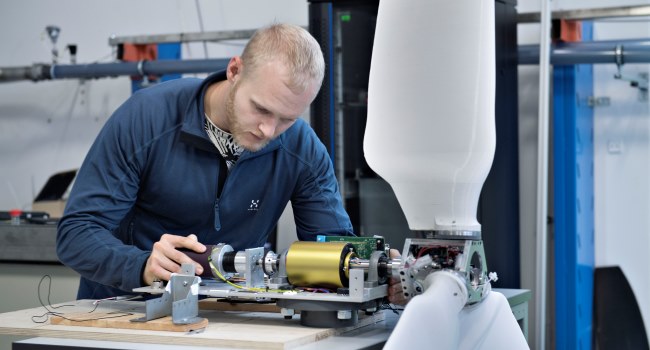Applied Industrial Electronics

Power electronics, electrical machines, instrumentation, automation and robots play key roles in our society today. With an education in Applied Industrial Electronics in Esbjerg you can help shape the development of these areas.
The bachelor's programme in Applied Industrial Electronics equips you to work as an electronic engineer. In the programme, you will learn how power electronic converters and electrical machines function and how they are developed. For example, you can work with underwater robots or on how wind turbines are controlled.
During the programme, you also gain knowledge about embedded systems and about computers and programming, and you learn about signal processing, instrumentation, automation and about mechatronics and robots. In addition to knowledge about how to develop systems, you also learn how to test and validate systems to ensure that they work as intended.

With a bachelor's degree in Applied Industrial Electronics you can go on for an MSc in Engineering. As an engineer, you can work in the process, automation, and energy industry where you can develop new converters and machines for wind turbines, work with energy and performance optimisation of industrial processes or with mechatronic systems for things like robots or wave energy systems.
During your training you will work closely with companies for your project work. The projects are based on the industry's current issues and are organised so that you and your project group are constantly challenged to think in innovative, creative and systematic ways in order to find new solutions.
The program in Applied Industrial Electronics is an English language programme that takes place in an international environment and is offered internationally. This means that in addition to your academic competencies you also develop your language skills. The international environment can also provide you with intercultural competences that will serve you well in your future career.
Przy rekrutacji na tę uczelnię uwzględnia się wymiar godzin zrealizowanych z konkretnych przedmiotów w szkole średniej, wyniki w nauce oraz odpowiedni list motywacyjny.
Wypis godzin oraz ocen – bardzo ważne jest załączenie wypisu. Szczegółowe informacje na temat sposobu wypełniania tego dokumentu oraz termin jego przesłania znajdziesz tutaj.*
Spełnienie wymagań w zakresie języka angielskiego można udokumentować w następujący sposób:
IELTS – 6.5
TOEFL – 88
- Matematyka. Całkowity czas nauki matematyki w szkole średniej powinien wynosić co najmniej 375 godzin (zegarowych).
- Fizyka. Całkowity czas nauki fizyki w szkole średniej powinien wynosić co najmniej 200 godzin (zegarowych).
- Język angielski. Całkowity czas nauki języka angielskiego w szkole średniej powinien wynosić co najmniej 210 godzin (zegarowych).
With a bachelor's degree in Applied Industrial Electronics you can go on for an MSc in Engineering. As an engineer, you can work in the process, automation, and energy industry where you can develop new converters and machines for wind turbines, work with energy and performance optimisation of industrial processes or with mechatronic systems for things like robots or wave energy systems.
During your training you will work closely with companies for your project work. The projects are based on the industry's current issues and are organised so that you and your project group are constantly challenged to think in innovative, creative and systematic ways in order to find new solutions.
The bachelor's programme in Applied Industrial Electronics is especially organised for those who wish to continue in a two-year master's program in engineering (MSc).
As an engineer in Applied Industrial Electronics you can handle complex and development-oriented situations in the electronics and power electronics area, and you possess competencies on microprocessor systems, electrical machines and robotic systems that can be used in development, planning and operation of industrial energy systems.
With an MSc in Engineering you can, for example, work in
The process industry
The wind turbine industry
Energy companies
Manufacturing companies for electronics and electrical machines
The offshore industr
